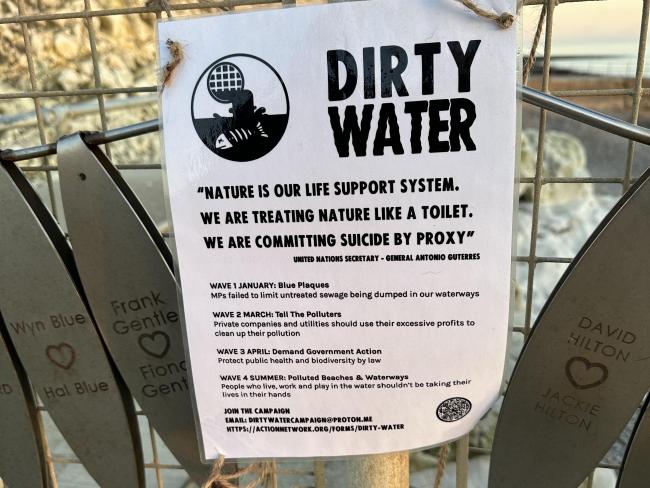
Protesting against dirty water. Photo Workers.
Britain’s regulators are supposed to provide safeguards for the public. Their record is woeful…
Britain has many regulators – bodies appointed to oversee the working of an industry or an aspect of the economy. They are supposed to provide safeguards, independent of the businesses or organisations directly involved.
Many were created to provide a fig leaf for the 1980s privatisations – asset-stripping on a grand scale. Their record has been woeful – most notably Ofwat. The stink of its failure is hard to ignore.
In the face of growing outrage over the continuing release of untreated waste into rivers and seas, England’s water companies have announced a £10 billion investment programme. But they will finance this out of price rises to the customer.
The licence from Ofwat to operate stipulates how much each company must set aside from profits to fund repairs and infrastructure work. But the money has found its way into the pockets of shareholders and company directors by way of dividends. Customers are effectively paying twice for the same thing.
The release of raw sewage was originally permitted as a relief valve to prevent treatment works being overwhelmed during exceptionally wet weather. Yet it is now commonplace, even in dry weather. The impact on people’s health and well-being is evident – swimming and other water based activities curtailed in rivers, beaches closed, wildlife threatened.
Take Yorkshire Water. The Guardian published a report in May about sewage discharge in the river Nidd in North Yorkshire in 2020. Peter Hammond, a retired professor, monitored releases at four treatment works. The equivalent of 317 Olympic swimming pools of raw sewage was discharged in that one year.
Arrogance
The company’s arrogant response was that perceptions about river pollution were partly down to “…a change in expectations from residents”, suggesting that people are unnecessarily fussier than we used to be – and a denial of their experience.
The water companies trot out the usual excuses. Failures of Victorian pipework is one. That won’t wash – just under 12 per cent of the network is that old. And according to a report in the Financial Times on 13 August, again based on Peter Hammond’s work, 80 per cent of sewage spills are down to lack of capacity – not weather or climate change.
‘The companies trot out the usual excuses…’
Water companies are failing on other counts too. No new reservoir has been built since 1991, though the population has grown by 10 million since then. Rationing by hosepipe bans and water meters shows that the water companies are organisations for syphoning money from customers rather than utilities for serving public need.
The water industry was privatised in 1989, part of Thatcher’s wave of privatisations. The sell-off of national assets was trumpeted as a way of increasing efficiency, properly regulating the industries and increasing share ownership in society.
What’s happened with water since then shows those were all lies. Handed over to private capital debt free, 70 per cent of England’s water companies are owned by international investment banks and companies operating out of tax havens.
And where is the regulator? The failure of Ofwat even to enforce its legal requirements obliged the House of Lords Industry and Regulators Committee to investigate. Its report, The affluent and the effluent, details Ofwat’s failure to stop environmental pollution and ensure investment in infrastructure. One of its recommendations is that government give Ofwat guidance on how to regulate!
Ofwat’s response was limited to “calling out” the worst performing water companies last year. Unsurprisingly that made little difference. Ofwat’s idea of regulation is to fine the company, which is then passed on to the customer through their bills.
Water companies should be held to account. Campaigners like Peter Hammond and musician Feargal Sharkey provide evidence daily. Now it’s time for heavy fines not passed on to customers, and substantial prison terms for directors whose decisions carry out this legalised piracy.
